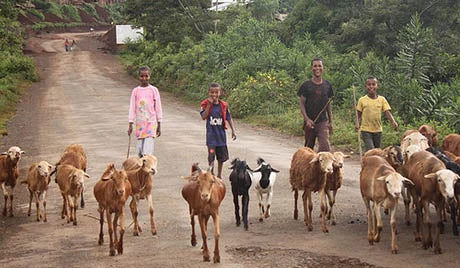Today, three countries – Norway, the United Kingdom and the United States – pledged $280 million to the World Bank’s BioCarbon Fund, kicking off a groundbreaking initiative for sustainable forest landscapes.
Their significant commitment to land and forest preservation is important for two reasons.
The new Initiative for Sustainable Forest Landscapes will manage landscapes in a holistic fashion by working across sectors, rather than in “silos.” It also brings in the private sector already in the design phase, recognizing that many private firms are committed to “greening” and securing their supply chains from the impact of climate change.
Subsistence and commercial farming, livestock grazing and logging for fuel wood and construction often compete for land and resources in a growing economy. All these activities are important for development and poverty reduction, but they must be managed in a sustainable manner to minimize forest loss and climate effects.
We need to be looking at the big picture, from a landscape point of view, and ask ourselves: How can we incentivize all stakeholders to change their patterns of behavior and lessen the pressure on forests?
Right now, we’re engaging with farmers, government representatives, private companies and non-governmental organizations to incentivize better land management at a greater scale. The initiative will combine reforestation, reducing emissions from deforestation and forest degradation, agriculture, biomass energy activities, and policy interventions in an integrated approach to tackle climate change, strengthen food security, and increase the resilience of local communities and environments.
By working with scaled-up programs within a large administrative boundary, we will explore ways to incentivizing change through policy changes as well as on-the-ground actions, building on our previous experience with results-based finance.
The Initiative for Sustainable Forest Landscapes acknowledges in its design the central role the private sector can play. We always valued the existing public-private partnership that we had in the BioCarbon Fund, and we have been thinking of ways to expand such collaboration. This could take various forms, including technical expertise, investments, or agreements to purchase carbon credits that the programs will generate.
To facilitate the participation of the private sector, we brought large multinational companies such as Unilever, Mondelez, and Bunge to the table from the inception to discuss models that support their agriculture, forestry and land-use activities – while helping the environment and local communities. We are also exploring working with smaller local enterprises.
Many companies have publically recognized the importance of sustainable practices and we are happy to see these large companies’ commitment and support for greening and securing supply chains and strengthening climate-smart agricultural practices. We hope that sustainable commodities will attract and leverage private capital in areas that have traditionally been overlooked.
With its specific focus on the agricultural drivers of deforestation – and its emphasis on crowding in private companies that source commodities in countries with tropical forests – the Initiative for Sustainable Forest Landscapes presents a unique approach and fills a niche that other forest and climate initiatives have not prioritized.
I see an increasingly important role for green climate finance as an important incentive mechanism for countries to opt for rural climate-smart development. Through the BioCarbon Fund, we now have a decade’s worth of experience reducing mitigation impacts in the land use sector – although this is one sector where it is hard to draw the line between mitigation and adaptation.
This new initiative is certainly about the climate and land, but it is ultimately about people affected by climate change.



Join the Conversation